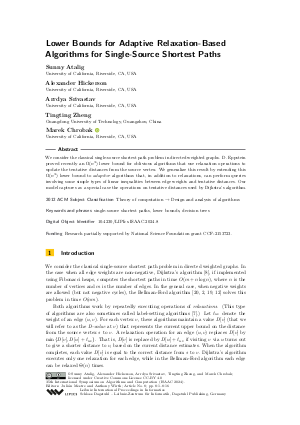Lower Bounds for Adaptive Relaxation-Based Algorithms for Single-Source Shortest Paths
Authors
Sunny Atalig,
Alexander Hickerson,
Arrdya Srivastav,
Tingting Zheng,
Marek Chrobak 
-
Part of:
Volume:
35th International Symposium on Algorithms and Computation (ISAAC 2024)
Part of: Series: Leibniz International Proceedings in Informatics (LIPIcs)
Part of: Conference: International Symposium on Algorithms and Computation (ISAAC) - License:
 Creative Commons Attribution 4.0 International license
Creative Commons Attribution 4.0 International license
- Publication Date: 2024-12-04
File

PDF
LIPIcs.ISAAC.2024.8.pdf
- Filesize: 1.07 MB
- 16 pages
Document Identifiers
Subject Classification
ACM Subject Classification
- Theory of computation → Design and analysis of algorithms
Keywords
- single-source shortest paths
- lower bounds
- decision trees
Metrics
- Access Statistics
-
Total Accesses (updated on a weekly basis)
0PDF Downloads0Metadata Views
Abstract
We consider the classical single-source shortest path problem in directed weighted graphs. D. Eppstein proved recently an Ω(n³) lower bound for oblivious algorithms that use relaxation operations to update the tentative distances from the source vertex. We generalize this result by extending this Ω(n³) lower bound to adaptive algorithms that, in addition to relaxations, can perform queries involving some simple types of linear inequalities between edge weights and tentative distances. Our model captures as a special case the operations on tentative distances used by Dijkstra’s algorithm.
Cite As Get BibTex
Sunny Atalig, Alexander Hickerson, Arrdya Srivastav, Tingting Zheng, and Marek Chrobak. Lower Bounds for Adaptive Relaxation-Based Algorithms for Single-Source Shortest Paths. In 35th International Symposium on Algorithms and Computation (ISAAC 2024). Leibniz International Proceedings in Informatics (LIPIcs), Volume 322, pp. 8:1-8:16, Schloss Dagstuhl – Leibniz-Zentrum für Informatik (2024)
https://doi.org/10.4230/LIPIcs.ISAAC.2024.8
BibTex
@InProceedings{atalig_et_al:LIPIcs.ISAAC.2024.8,
author = {Atalig, Sunny and Hickerson, Alexander and Srivastav, Arrdya and Zheng, Tingting and Chrobak, Marek},
title = {{Lower Bounds for Adaptive Relaxation-Based Algorithms for Single-Source Shortest Paths}},
booktitle = {35th International Symposium on Algorithms and Computation (ISAAC 2024)},
pages = {8:1--8:16},
series = {Leibniz International Proceedings in Informatics (LIPIcs)},
ISBN = {978-3-95977-354-6},
ISSN = {1868-8969},
year = {2024},
volume = {322},
editor = {Mestre, Juli\'{a}n and Wirth, Anthony},
publisher = {Schloss Dagstuhl -- Leibniz-Zentrum f{\"u}r Informatik},
address = {Dagstuhl, Germany},
URL = {https://drops.dagstuhl.de/entities/document/10.4230/LIPIcs.ISAAC.2024.8},
URN = {urn:nbn:de:0030-drops-221356},
doi = {10.4230/LIPIcs.ISAAC.2024.8},
annote = {Keywords: single-source shortest paths, lower bounds, decision trees}
}
Author Details
Funding
Research partially supported by National Science Foundation grant CCF-2153723.
References
- Michael J. Bannister and David Eppstein. Randomized speedup of the Bellman-Ford algorithm. In Proceedings of the 9th Meeting on Analytic Algorithmics and Combinatorics, ANALCO 2012, pages 41-47. SIAM, 2012. URL: https://doi.org/10.1137/1.9781611973020.6.
-
Richard Bellman. On a routing problem. Quart. Appl. Math., 16:87-90, 1958.

- Aaron Bernstein, Danupon Nanongkai, and Christian Wulff-Nilsen. Negative-weight single-source shortest paths in near-linear time. In Proceedings of the 63rd IEEE Annual Symposium on Foundations of Computer Science, FOCS 2022, pages 600-611, 2022. URL: https://doi.org/10.1109/FOCS54457.2022.00063.
- Béla Bollobás and Oleg Pikhurko. Integer sets with prescribed pairwise differences being distinct. European Journal of Combinatorics, 26(5):607-616, 2005. URL: https://doi.org/10.1016/J.EJC.2004.04.008.
- Gang Cheng and Nirwan Ansari. Finding all hops shortest paths. IEEE Commun. Lett., 8(2):122-124, 2004. URL: https://doi.org/10.1109/LCOMM.2004.823365.
- Michael B. Cohen, Aleksander Madry, Piotr Sankowski, and Adrian Vladu. Negative-weight shortest paths and unit capacity minimum cost flow in Õ(m^10/7 log W) time (extended abstract). In Proceedings of the Twenty-Eighth Annual ACM-SIAM Symposium on Discrete Algorithms, SODA 2017, pages 752-771, 2017. URL: https://doi.org/10.1137/1.9781611974782.48.
- Narsingh Deo and Chi-Yin Pang. Shortest-path algorithms: Taxonomy and annotation. Networks, 14(2):275-323, 1984. URL: https://doi.org/10.1002/NET.3230140208.
- Edsger W Dijkstra. A note on two problems in connexion with graphs. Numerische Mathematik, 1(1):269-271, 1959. URL: https://doi.org/10.1007/BF01386390.
- David Eppstein. Lower bounds for non-adaptive shortest path relaxation. In Proceedings of the 18th International Symposium on Algorithms and Data Structures, WADS 2023, pages 416-429, 2023. URL: https://doi.org/10.1007/978-3-031-38906-1_27.
-
P. Erdös and P. Turán. On a problem of Sidon in additive number theory, and on some related problems. Journal of the London Mathematical Society, s1-16(4):212-215, 1941.

- Jeremy T. Fineman. Single-source shortest paths with negative real weights in Õ(mn^8/9) time. In Proceedings of the 56th Annual ACM Symposium on Theory of Computing, STOC 2024, pages 3-14, 2024. URL: https://doi.org/10.1145/3618260.3649614.
-
L. R. Ford. Network Flow Theory. RAND Corporation, Santa Monica, CA, 1956.

- Andrew V. Goldberg. Scaling algorithms for the shortest paths problem. SIAM Journal on Computing, 24(3):494-504, 1995. URL: https://doi.org/10.1137/S0097539792231179.
- Roch Guérin and Ariel Orda. Computing shortest paths for any number of hops. IEEE/ACM Trans. Netw., 10(5):613-620, 2002. URL: https://doi.org/10.1109/TNET.2002.803917.
- Jialu Hu and László Kozma. Non-adaptive Bellman-Ford: Yen’s improvement is optimal. CoRR, abs/2402.10343, 2024. https://arxiv.org/abs/2402.10343, URL: https://doi.org/10.48550/arXiv.2402.10343.
- Stasys Jukna and Georg Schnitger. On the optimality of Bellman-Ford-Moore shortest path algorithm. Theor. Comput. Sci., 628:101-109, 2016. URL: https://doi.org/10.1016/J.TCS.2016.03.014.
- Tomasz Kociumaka and Adam Polak. Bellman-Ford is optimal for shortest hop-bounded paths. In Proceedings of the 31st Annual European Symposium on Algorithms, ESA 2023, pages 72:1-72:10, 2023. URL: https://doi.org/10.4230/LIPICS.ESA.2023.72.
- Ulrich Meyer, Andrei Negoescu, and Volker Weichert. New bounds for old algorithms: On the average-case behavior of classic single-source shortest-paths approaches. In Proceedings of the First International ICST Conference on Theory and Practice of Algorithms in (Computer) Systems, TAPAS 2011, pages 217-228, 2011. URL: https://doi.org/10.1007/978-3-642-19754-3_22.
-
E. F. Moore. The shortest path through a maze. In Proceedings of an International Symposium on the Theory of Switching, Part II, pages 285-292, 1959.

-
A. Shimbel. Structure in communication nets. In Proceedings of the Symposium on Information Networks, pages 199-203. Polytechnic Press of the Polytechnic Institute of Brooklyn, 1955.

-
James Singer. A theorem in finite projective geometry and some applications to number theory. Trans. Amer. Math. Soc., 43(3):377-385, 1938.

- Andrew Chi-Chih Yao. Probabilistic computations: Toward a unified measure of complexity (extended abstract). In Proceedings of the 18th Annual Symposium on Foundations of Computer Science, pages 222-227, 1977. URL: https://doi.org/10.1109/SFCS.1977.24.
-
Y. Yen. Shortest Path Network Problems, volume 18 of Mathematical Systems in Economics. Verlag Anton Hain, Meisenheim am Glan, 1975.

